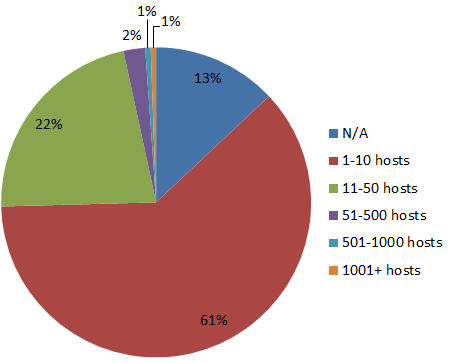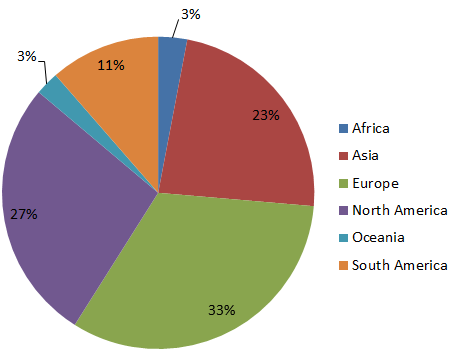A few weeks ago, we launched our first XCP User Survey. We nearly had 500 responses when I compiled a preliminary analysis of the survey results. First, I wanted to thank everybody who participated. Of all respondents 38% of respondents are using XCP today, 40% are evaluating XCP or planning to do so and 22% just filled out the survey. Amongst people using or evaluating XCP, 56% of respondents are interested in XCP for personal purposess and 44% for business reasons. Interestingly enough, the proportion of XCP users amongst business users is 62% compared to 25% of personal users.
For, the remainder of this report we removed respondents who are neither using XCP nor planning to do so. Below are some interesting facts.
Users by Continent
What XCP users care about
The next questions relate to XCP properties. People could choose on a scale covering Strongly Disagree (1), Disagree(2), Neither Disagree nor Agree (3), Agree (4)and Strongly Agree (5), which I used to calculate an average score.
When asked “which of the following XCP properties are important to you“, respondents replied:
- Being able to Install XCP from an ISO is important (3.7)
- Being able to compile and install third party drivers and software for dom0 is important (3.5)
- Being able to build and installing XCP toolstack packages into any Linux distro is important (3.3)
- Being able to build individual XCP components from source is important (3.0)
- Being able to build the entire XCP ISO from source is important (2.8)
When asked “which of the following virtualization features are important to you“, the replies were as follows:
- VM life cycle functionality: live snapshots, checkpoint, migration (4.4)
- Resource pools, flexible storage and networking (4.4)
- High Availability (4.3)
- Nondisruptive upgrade and patching capabilities (4.2)
- Real-time performance monitoring and alerting (4.1)
When asked “which of the following product characteristics are important to you“, respondents replied:
- Reliability and Robustness, meaning an architecture that reduces unexpected errors and reliably recovers in unexpected error situations (4.4)
- I/O and Network Performance, meaning performance of disk, network and other I/O peripherals in a virtualized environment (4.3)
- Performance, meaning the performance of your workload in a virtual machine (4.3)
- Scalability, meaning the size of environment your virtualization product will support with good performance (4.0)
- Versatility, meaning the capability to customize your virtualization solution to all of your needs (3.8)
- Security, such as additional security functionality such as SELinux, XSM, Disaggregation, etc. (3.7)
- Ease of Use, covering how easy it is to get started and how easily the most common use-cases can be performed (3.7)
- Commercial Support, covering commercial support, fast access to hotfixes/security patches, consulting, etc. (2.9)
Reasons for using XCP
Environment and Use Cases
Main use case

We asked what use-cases respondents use XCP for. The diagram above shows responses of users that described themselves as business users. The majority of personal users did not respond to this question. Those who did stated use-cases such as learning, studying, testing, home VDI set-ups or personal home set-ups (VOIP, web servers, mail servers, Git, etc. running in different VMs) .
Cloud Orchestrations Layers in use/planned to be used
The diagram above shows the rersponses of business users. The majority of personal users (70%) did not consider to use cloud orchestration stacks. Of those who did, 13% stated their preference is Cloudstack, 12% stated that their preference is OpenStack and 5% stated that their preference is OpenNebula.
Business Users
People that considered themselves as business users of XCP cared pretty much about the same system characteristics as all users. Below are some interesting facts related to commercial use of XCP.
Company Size
Size of XCP Installation
Note that we did not ask users that stated that they use XCP for personal reasons this question. Respondents that did not want to answer, had the option to answer with “N/A”.

Next Steps
I sampled results when we had just under 250 results and the outcome of the survey was very similar. Unless, there are significant changes going forward, or interesting new facts, I will not re-publish results. It may however be interesting to run a survey on Xen usage in general. Let me know what you think.




